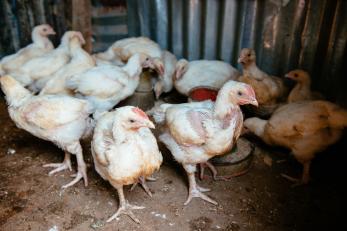How poultry farming helped a mother provide for her family

For families displaced by the ongoing crisis in northeast Nigeria, one of the hardest struggles for individuals is regaining a livelihood to sustain their families. At 40 years old Falmata Hamza was selected to be a Poultry Development Resettlement (PDR) participant. One of the PDR program's focus is to provide alternative livelihoods for vulnerable returnee female-headed households as poultry producers. For her, it meant that she could now provide for her family through her own business.
“Before the crises in Borno we engaged in sheep and goat fattening and were later displaced, but now the PDR has given us the chance to do something that will give us income,” said Falmata.
The mother of eight stays in a household with her husband and two other family members, where they now live in Alkalari community of Damboa LGA, Borno State, one of the key program locations. She is one of the smallholder poultry farmers who received 20 Noiler pullets (chickens) during the PDR program's first cycle of product distribution, which was done on a 50% shared cost with the farmers. This meant that she bought 10 pullets at the cost of 5,000 naira and was supported by the program with 10 additional pullets, totaling 20 chickens in her possession to start off with.
Since Falmata has started the business, she has spent minimal cost on tending to her chickens; she breeds them in her backyard where they are kept in a ventilated pen and fed easily with feed made from maize bran and kitchen waste. She makes sure to clean the pen regularly to maintain a hygienic environment. So far, she has gained a substantial amount of money as profit, with additional money from the sale of eggs produced by the chickens. She said she bought the chickens and took care of them for 10,000 Naira, but was able to gain 40,000 Naira from selling some of her stock, while she kept the female chickens to continue egg production. From her gains, she is able to buy basic necessities (medicine, food, school fees) for her family. Her family's nutrition has has been improved due to the availability of fresh eggs in addition to fresh food assistance received from Mercy Corps' Nigeria REACH 3 program.
Falmata hopes that she can expand her business to serve as a mother unit and thus become a vendor on the PDR program. Mother units are the vendors responsible for stocking up on chicken breeds, from which smallholder farmers get their supplies.
“My future plan is to go as far as being a mother unit to have direct contact with AMO farm so as to expand my business to include my cattle fattening,” says Falmata.